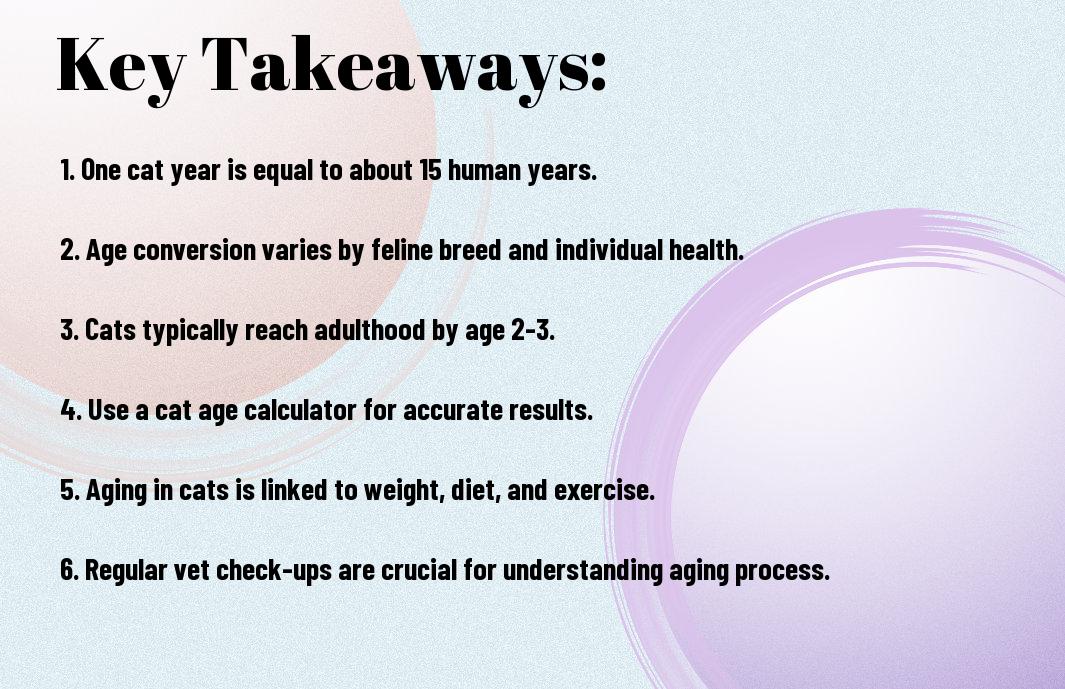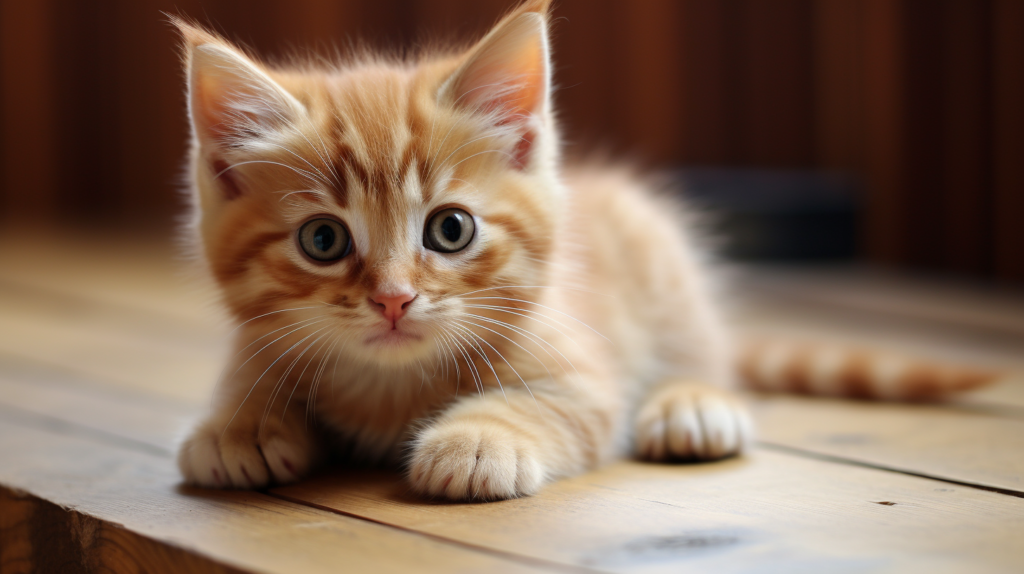Educate yourself about feline aging with this comprehensive guide to calculating your cat’s age in human years. Understanding your pet’s life stage is crucial for providing proper care and addressing potential health risks. By learning how to accurately determine your cat’s age in human years, you can make informed decisions about diet, exercise, and veterinary care to ensure a long and healthy life for your beloved feline companion.

The Basics of Feline Aging
Any cat owner understands the importance of understanding their pet’s age and the corresponding life stage they are in. Just like humans, cats go through various stages of development that impact their behavior, health, and overall well-being. By understanding the basics of feline aging, you can better care for your furry friend and ensure they live a long, healthy life.
Learn What’s Your Cat Age in Human Years With Our Calculator
Just enter your cat’s estimated age, and this calculator will give you the answer of How old is your cat according to Human Years! 🙂
Key Stages in a Cat’s Development
Any cat’s life can be divided into several key stages, including kittenhood, adolescence, adulthood, and senior years. Each stage comes with its own set of unique characteristics and requirements, so it’s important for cat owners to be aware of these differences to provide the best care.
Understanding these key stages is essential for recognizing the specific needs and potential health issues that may arise at each stage of a cat’s life. By being aware of these key developmental stages, you can adjust your care and attention to ensure your cat’s needs are met at every age.
The First Two Years Explained
Basics
Feline growth and development are most rapid during the first two years of life, with the first year being particularly crucial. Kittens typically reach adulthood by the age of one, and their behavior and physical development during this time are essential for setting the stage for a healthy adult life. It’s important for cat owners to provide a balanced diet, regular vet check-ups, and plenty of mental and physical stimulation during these critical first years to ensure their cat grows up to be healthy and happy.
Calculating Mature Cat Years
If you’re wondering how old your mature cat is in human years, there are a few different methods you can use to estimate their age. The most common method is the “Multiplier Method”, but there are also alternative methodologies you can explore to get a more accurate age estimate for your feline friend.
For more information on calculating your cat’s age in human years, you can check out our blog post How Old Is My Cat in Human Years?
The Multiplier Method
On average, one cat year is roughly equivalent to approximately four human years. This means that a 5-year-old cat would be about 36 in human years, and a 10-year-old cat would be around 56. While this method is a quick and easy way to estimate your cat’s age, it may not provide the most accurate result, as it doesn’t account for the varying aging rates of cats at different life stages.
Alternative Methodologies
Calculating your cat’s age using the human age multiplier is just one way to estimate their age in human years. There are alternative methodologies that take into consideration the varying aging rates of cats at different life stages. These methodologies include taking into account the breed, size, and overall health of the cat to get a more accurate estimate of their age in human years.
Methodologies such as the “Feline Aging Chart” or the “Adjusted Age Method” can provide a more precise calculation of your cat’s age and help you better understand their life stage and any potential health risks.

Considerations for Senior Cats
Not all cats age at the same rate, and just like humans, their needs can change as they get older. It’s important to be aware of the special considerations for senior cats in order to provide them with the best care possible.
Special Age-Related Care
Any senior cat may require extra attention to their dental health, as they are more prone to dental issues such as gum disease and tooth decay. Regular veterinary check-ups become even more crucial for senior cats to monitor for any age-related health concerns. It’s also important to ensure that they have a comfortable, warm environment as they may become more sensitive to temperature changes.
Recognizing the Signs of Age in Cats
Cats may start to show signs of aging such as decreased mobility, changes in behavior, and decreased appetite. It’s important to be aware of these changes and seek veterinary care if you notice any concerning signs. Changes in their grooming habits and appearance, as well as increased sleeping, are also common signs of aging in cats.
To ensure the well-being of your senior cat, it’s important to be proactive in recognizing and addressing any signs of aging that may arise. By staying vigilant and providing them with the appropriate care, you can help improve their quality of life in their senior years.
Advanced Tips and Tricks
Keep in mind that calculating your cat’s age in human years is not an exact science, but there are some advanced tips and tricks that can help you get a more accurate estimate.
- Factoring in Breed and Size: Consider that different cat breeds and sizes age at different rates. Use the following table to adjust your calculations based on your cat’s breed and size:
Factoring in Breed and Size
For a more precise calculation, it’s important to take into account your cat’s breed and size. Larger breeds tend to have shorter lifespans and age at a faster rate, while smaller breeds generally live longer and age more slowly.

Breed and size are not the only factors that influence a cat’s lifespan. Genetics, diet, exercise, and overall health play a significant role in determining how long a cat will live. It’s important to consider these factors when calculating your cat’s age in human years.
Health and Lifespan Expectancy
Tips for maintaining your cat’s health and extending their lifespan include regular veterinary check-ups, a balanced diet, exercise, and keeping them indoors to protect them from potential dangers.
Conclusion
Hence, after carefully following the steps outlined in this guide, you should now have a better understanding of how to calculate your cat’s age in human years. By taking into account the various factors such as breed, size, and genetics, you can accurately determine your feline companion’s age relative to a human’s. It’s important to remember that this is just an approximation and that every cat is unique, so consulting with a veterinarian is always recommended for specific health and age-related concerns. Armed with this knowledge, you can provide your cat with t
FAQ
How do I calculate my cat’s age in human years?
To calculate your cat’s age in human years, you can use the common method of multiplying the first year by 15, adding the second year, and then adding 4 for each additional year. However, this method is not entirely accurate. A more accurate method is to use an age conversion chart specifically designed for cats, which takes into account the varying aging rates of cats at different life stages.
Why is it important to know my cat’s age in human years?
Knowing your cat’s age in human years is important for understanding their life stage and adjusting their care and nutrition accordingly. Cats age at different rates compared to humans, and their needs change as they get older. By knowing their age in human years, you can better monitor their health, anticipate age-related issues, and provide them with the appropriate care and attention.
Can I use the same age conversion chart for all cats?
Different breeds of cats and individual cats may age at different rates, so it’s important to use an age conversion chart that takes these differences into account. Additionally, your cat’s overall health, lifestyle, and genetics can also affect their aging process. It’s best to consult with a veterinarian to get a more accurate understanding of your cat’s age in human years and how to best meet their specific needs.

Hello there, I am Iftekhar Ahmed. I am the owner of Mishka & The Cat Corners. I love to explore and write on various topics about cats

